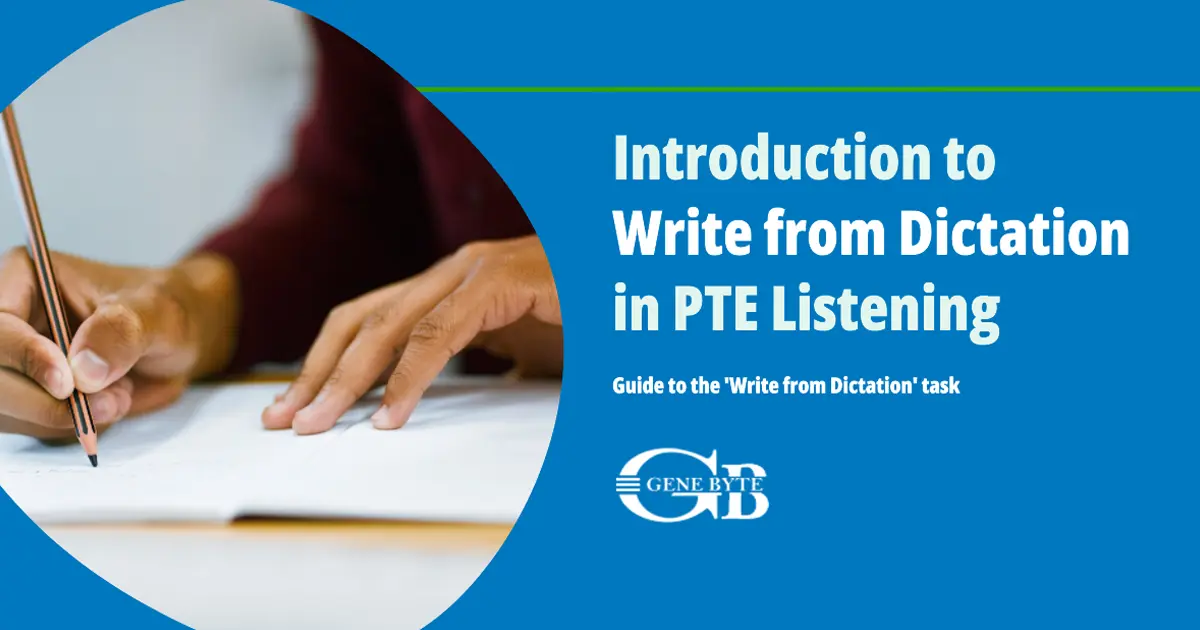Discussing PTE Listening's Write from Dictation: An Essential Guide for Teachers
Unlocking the PTE Listening's Write from Dictation Task in PTE Academic for Educators

"Unlock the full potential of your students in PTE Academic - 'Write from Dictation' is not just a task, it's a gateway to linguistic excellence."
Is Write from Dictation the key to unlocking your students' potential in PTE Academic? This task, a critical component of the Listening Section, is more than just transcription. It blends listening acuity, cognitive processing, and linguistic precision. At Genebyte, we understand the pivotal role this task plays in shaping a candidate's overall performance.
Key Takeaways:
- Task Requirements: Listen to a short sentence, understand it, and accurately reproduce it in written form.
- Skills Assessed: Evaluates listening and writing skills, focusing on comprehension, retention, and precise reproduction.
- Effective Strategies: Understanding the task helps educators develop teaching methods tailored to its requirements.
- Empowering Educators: By understanding the mechanics of this task, teachers can effectively prepare their students to excel. It's not just about hearing words; it's about comprehending, retaining, and accurately reproducing them under exam conditions.
By mastering the Write from Dictation task, educators can significantly improve their students' performance in the PTE Academic exam. Genebyte provides the insights and techniques needed to excel in this specific segment and the entire PTE Academic test.

Introduction to Write from Dictation in PTE Academic
Definition and Overview
Write from Dictation is a crucial component of the PTE Academic exam, primarily assessing two core skills:
Listening and Writing. This question-type follows Highlight Incorrect Words, and here candidates listen to a short audio recording, usually lasting between 3 to 5 seconds, and are required to accurately type the sentence they hear. This task is a direct test of a student's ability to process spoken English and transcribe it effectively, challenging both their auditory processing and written expression skills.
At Genebyte, we emphasize the multifaceted nature of this task. It's not merely about hearing words but understanding their context, grasping the sentence structure, and reproducing the content without errors. This dual aspect of listening comprehension and writing precision makes Write from Dictation a vital part of PTE Academic's assessment criteria.
Importance in PTE Academic
In the PTE Academic landscape, the significance of Write from Dictation extends far beyond a basic transcription exercise. It serves as a comprehensive metric to gauge a candidate's:
- Listening Proficiency: The ability to accurately understand spoken English in an academic context.
- Writing Accuracy: Skills in spelling, punctuation, and word order, crucial for academic success.
- Cognitive Processing: How effectively a student can remember and reproduce spoken information.
| Skill Assessed | Description | Importance in PTE Academic |
|---|---|---|
| Listening Proficiency | Ability to understand and interpret spoken English | Integral for academic and real-world English usage |
| Writing Accuracy | Correct spelling, grammar, and sentence structure in written English | Essential for academic writing and correspondence |
| Cognitive Processing | Memory and transcription accuracy in replicating spoken sentences | Reflects real-world language application and academic readiness |
For educators and coaching institutes, understanding the depth and breadth of Write from Dictation is key to enhancing their training methods. By focusing on this task, teachers can significantly influence their students' overall performance in the PTE Academic exam. Genebyte's B2B SaaS solution offers a suite of tools designed to aid educators in this endeavor, providing comprehensive resources and analytics to refine teaching strategies and maximize student outcomes.

Understanding the Task: Write from Dictation in PTE Academic
Description of the Write from Dictation Task
The 'Write from Dictation' task in the PTE Academic is a crucial test of auditory and written skills. In this task, test-takers listen to a short audio clip, typically lasting between 3 to 5 seconds, and are required to type out the sentence they hear. The challenge lies not only in accurately capturing every word but also in ensuring correct spelling and grammar.
At Genebyte, we emphasize the significance of this task in the PTE Academic context. It is designed to mimic real-life academic scenarios where students must comprehend lectures and transcribe key information. This task, therefore, is a realistic measure of a student's ability to process and document spoken language, a skill essential in academic and professional environments.
Audio Length and Time Allocation
The brief duration of the audio in Write from Dictation underscores the need for immediate comprehension and swift, accurate typing skills. This aspect of the task aligns well with Genebyte's training approach, where we focus on enhancing students' ability to process information quickly and respond effectively.
| Feature | Description | Impact on Test-Takers |
|---|---|---|
| Audio Length | Typically 3-5 seconds | Requires quick comprehension and response |
| Time Allocation | No specific time limit for transcription | Demands efficient typing and accuracy |
Skills Assessed
This task assesses a blend of listening and writing skills, crucial for PTE Academic success.
List of Skills Assessed in Write from Dictation:
- Listening Comprehension: Understanding spoken English in an academic setting.
- Typing and Transcription: Accurate and swift typing of what is heard.
- Spelling and Grammar: Correct usage of English spelling and grammar.
- Memory and Recall: Ability to remember and reproduce spoken sentences.
- Attention to Detail: Noticing and replicating even minor elements of speech.

Scoring Criteria for Write from Dictation
How Responses are Evaluated
In PTE Academic's 'Write from Dictation' task, responses are meticulously evaluated on several key parameters. The primary focus is on the exact reproduction of the sentences heard. This involves a detailed assessment of each word's spelling, the structure of the sentence, and the overall accuracy of the transcription. At Genebyte, we stress the importance of precision in this task, as even minor deviations can lead to score deductions.
Content Scoring: Accuracy and Completeness
| Criteria | Description | Importance in Scoring |
|---|---|---|
| Spelling Accuracy | Correct spelling of every word | Critical for full score attainment |
| Sentence Structure | Proper grammatical structure and word order | Essential for reflecting comprehension |
| Complete Reproduction | Inclusion of all words in the correct sequence | Vital for maximum score in this task |
Genebyte's advanced SaaS platform equips educators with tools to analyze these aspects in students' responses, enabling targeted feedback and improvement.
Weightage in Listening and Writing Modules
The 'Write from Dictation' task carries significant weightage in both the Listening and Writing Section of the PTE Academic. Its unique position as a task that tests both listening comprehension and written accuracy makes it a pivotal component in the overall score calculation.
- Listening Module: The accurate transcription of the spoken sentence directly influences the listening score. It tests the ability to comprehend and interpret spoken English in an academic context.
- Writing Module: Although primarily a listening task, the requirement for written accuracy contributes to the writing score, emphasizing the need for correct spelling and grammar.
| Module | Weightage Criteria |
|---|---|
| Listening | Comprehension accuracy |
| Immediate recall and transcription | |
| Writing | Spelling precision |
| Grammatical correctness |

Challenges Faced by Students in Write from Dictation
Common Difficulties Encountered
In the 'Write from Dictation' segment of the PTE Academic, students often face a unique set of challenges. These range from linguistic hurdles to cognitive load management. At Genebyte, through our B2B SaaS platform, we've identified common difficulties that educators should be aware of:
- Rapid Processing of Information: The brief audio clips demand quick comprehension and immediate recall, a task that can be daunting for non-native English speakers.
- Accurate Spelling: Even proficient students may struggle with spelling nuances, leading to errors in transcription.
- Grammar and Sentence Structure: Maintaining the integrity of the sentence structure as heard in the audio can be a complex task.
- Dialect and Pronunciation Variations: Diverse accents in the audio clips can pose additional challenges in understanding and transcription.
| Difficulty | Description | Genebyte's Solution |
|---|---|---|
| Rapid Information Processing | Quick understanding and memorization of audio | Targeted listening exercises |
| Spelling Nuances | Accurate reproduction of complex words | Spelling drills and tests |
| Grammatical Complexity | Maintaining correct structure and grammar | Grammar-focused training modules |
| Accent Comprehension | Understanding diverse pronunciations | Exposure to varied accent materials |
The Role of Memory and Attention
The 'Write from Dictation' task is not only a test of linguistic skills but also a measure of a student's memory and attention span. It requires:
- Short-term Memory Utilization: Holding and transcribing information from the audio clip involves robust short-term memory skills.
- Concentration and Focus: Continuous and undivided attention is essential to accurately capture every word and its sequence.

The Dual Role of Write from Dictation
Listening Skill Assessment
In the PTE Academic's 'Write from Dictation' task, the assessment of listening skills is multifaceted. This task requires candidates not only to understand spoken English but also to accurately remember and transcribe it. It gauges a student's ability to process spoken language in real time, a critical skill in academic and professional settings.
At Genebyte, we underscore the importance of this task in honing students' listening skills. Our B2B SaaS platform provides an array of auditory exercises and real-life simulation tests, enabling educators to enhance their students' ability to comprehend, interpret, and transcribe different accents and speeds of spoken English effectively.
Key Aspects of Listening Skill Assessment in Write from Dictation
- Comprehension: Understanding the content and context of spoken sentences.
- Memory: Retaining the sentence long enough to reproduce it accurately.
- Attention to Detail: Recognizing specific words, their order, and pronunciation nuances.
- Accent Interpretation: Adapting to various English accents and dialects.
Writing Skill Assessment
Like SST and LFIB, the WFD task simultaneously assesses a student's writing skill. This involves more than just typing what is heard; it tests a student's grasp of spelling, punctuation, and grammatical accuracy. Accurate transcription reflects a student's proficiency in written English, an essential skill for academic success.
Genebyte's platform enriches this learning experience by offering advanced writing modules. These modules focus on improving spelling accuracy, grammar, and sentence construction, vital for acing the 'Write from Dictation' task and, by extension, the PTE Academic exam.
| Aspect | Description | Genebyte's Training Focus |
|---|---|---|
| Spelling Accuracy | Correct spelling of complex and common words | Spelling drills and correctional tools |
| Grammar Precision | Use of correct grammatical structures | Grammar tutorials and exercises |
| Sentence Formation | Ability to form coherent and structured sentences | Writing practice with immediate feedback |

Significance for Educators
Understanding the Task for Effective Teaching
For educators aiming to excel in PTE Academic training, a deep understanding of the 'Write from Dictation' task is indispensable. This task not only tests a student's listening and writing skills but also reflects their comprehensive English proficiency. Recognizing the nuances of this task is crucial in devising teaching methodologies that are both effective and efficient.
At Genebyte, we advocate for a teaching approach that focuses on active listening and precise transcription. Our B2B SaaS solution offers a suite of tools designed to simulate real PTE Academic conditions, allowing educators to provide practical, exam-centric training. By integrating these tools into their curriculum, teachers can enhance students' ability to process, retain, and accurately reproduce spoken English, vital for excelling in the 'Write from Dictation' task.
Key Focus Areas for Educators in Write from Dictation
- Active Listening Skills: Training students to focus and comprehend spoken sentences.
- Transcription Techniques: Enhancing speed and accuracy in typing responses.
- Vocabulary Building: Expanding students' word knowledge for better understanding and spelling.
- Grammar and Sentence Structure: Emphasizing the importance of grammatical accuracy.
Implications for Training and Curriculum Development
The 'Write from Dictation' task has significant implications for PTE Academic training and curriculum development. It necessitates a curriculum that is dynamic, incorporating exercises that improve listening comprehension and written expression simultaneously. Understanding this task enables educators to tailor their teaching strategies to address specific challenges faced by students, thereby improving their overall performance in the PTE Academic exam.
Genebyte's SaaS platform plays a pivotal role in this context. It offers data-driven insights into student performance, enabling educators to identify areas needing improvement and adjust their teaching strategies accordingly. Our platform's comprehensive analytics tools provide real-time feedback on student performance, facilitating a more personalized and effective teaching approach.
| Aspect | Description | Genebyte's Contribution |
|---|---|---|
| Curriculum Customization | Tailoring teaching materials to address specific needs | Providing adaptable resources and assessments |
| Data-Driven Insights | Using performance analytics to guide teaching | Real-time feedback and detailed performance reports |
| Student Engagement | Keeping students motivated and focused | Interactive learning modules and practice tests |
| Continuous Improvement | Updating training methods based on student feedback | Regular updates and new feature integration |

Actionable Tips for Teachers to Enhance PTE Academic Success
- Active Listening: Use exercises that improve students' ability to quickly understand spoken English.
- Practice Transcription: Expose students to varied accents and speeds in audio clips to build transcription skills.
- Spelling and Grammar: Implement exercises to minimize errors in transcription.
- Memory Enhancement: Use mnemonic devices and repetition to improve short-term memory.
The Write from Dictation task tests both listening and writing skills, crucial for overall PTE Academic performance. Focusing on this task is essential for student success.
Explore Genebyte's Solutions
Genebyte's B2B SaaS solution provides resources to enhance listening and writing skills, real-time analytics, and personalized feedback. Integrating Genebyte's technology elevates your institute's training capabilities.
Transform your PTE Academic preparation with Genebyte's innovative tools. Elevate your teaching and improve student performance in 'Write from Dictation' and beyond. Contact us to learn more and join us in setting new standards in PTE Academic training.
Frequently Asked Questions
Write from Dictation in PTE Academic is a task where test-takers listen to a short audio recording, typically 3-5 seconds long, and then type the sentence they hear. It assesses both listening and writing skills, focusing on the ability to accurately transcribe spoken words.
Scoring in "Write from Dictation" is based on the accuracy of transcription. Points are awarded for each correctly spelled word that is placed in the correct order. The task significantly impacts both the listening and writing scores in the PTE Academic.
No, there is no negative marking in the "Write from Dictation" task. However, incorrect words or misspellings can lead to a loss of points for those specific errors.
The sequence of words in the "Write from Dictation" task is crucial. The words must be transcribed in the exact order as heard in the audio to receive full marks. This evaluates a student's attention to detail and memory recall.
- Audio Clip A short recording containing the sentence to transcribe.
- Response Box: Where students type the heard sentence.
- Skills Tested: Focus on listening comprehension and written accuracy.
The "Write from Dictation" task itself does not have a specific time limit for answering. However, it falls within the overall time constraints of the PTE Listening section, necessitating efficient time management.
- Listening Comprehension: Understanding and interpreting the spoken sentence.
- Transcription Accuracy: Correct spelling and grammatical reproduction.
- Memory and Recall: Retaining the sentence long enough for accurate transcription.
The audio in the "Write from Dictation" task is typically 3-5 seconds long, containing a single sentence that test-takers need to transcribe.
- Enhance Listening Skills: Use diverse audio materials to improve comprehension.
- Focus on Spelling and Grammar: Conduct exercises targeting these areas.
- Simulate Test Conditions: Use tools mimicking the PTE environment for practice.
"Write from Dictation" plays a dual role in the PTE Academic scoring, contributing significantly to both listening and writing scores. It assesses critical aspects of language proficiency, impacting the overall performance.
Educators can effectively teach the "Write from Dictation" task by incorporating varied listening exercises, focusing on spelling and grammar, and using technology like Genebyte's SaaS platform for realistic practice and performance tracking.